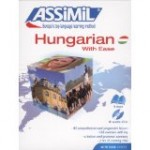Learn Hungarian with these resources
While Hungarian isn’t the most commonly studied of languages, I’m including it here, since I’m studying it myself. First things first: it’s not as hard as everyone says. The spelling system is as orderly as they get, the case system is well behaved, and the words sound really neat. I’m finding it to be an extremely friendly language, especially given that it’s my first journey outside of the Indo-European languages.
To learn Hungarian, you’re going need a way to learn correct pronunciation, a frequency dictionary to form your base vocabulary, and a good grammar book. You’ll also benefit from a thematic vocabulary book for specialized vocabulary and maybe a book or two, once you learn your first 1000 words. Make sure you read the Method sections of the website, then check out some of these recommended resources (pictures are links).
Pronunciation
First off, get a feel for how pronunciation works in English. The video tutorials here should help. Once you understand that, start working on Hungarian. Hungarian has a few tricky points, phonetically speaking. It has a few rounded frontal vowels, like French and German, so you might want to check out my French pronunciation video to learn how to make them. It also has vowel and consonant length distinctions, which are both tricky and really neat. “add” and “ad” are two different words, and “add” is just a longer “d”. Same with “kor” and “kór” – ó is longer than o, but otherwise sounds pretty-much identical (To my ears, ó is a little more closed and “ooh”-sounding than o, but still…tricky!)
To learn these, use your grammar book (the Colloquial Hungarian book starts with a lovely pronunciation guide with CDs), and supplement that with these three wonderful recordings from Rhinospike:
- A list of example words for all the letters of the alphabet
- Some minimal pairs
- Some more minimal pairs
If you want to chop them up into single files and put them in an Anki deck, use Audacity.
Anki language learners community on Reddit. You can even check out this Anki language learning blog for other Anki tips and tricks for learning Hungarian.
Your base vocabulary
I’ve made a base vocabulary list of 625+ words to start you off! As I talk about in that article, I find it easiest to translate those words using the short dictionaries at the end of a Lonely Planet Phrasebook; they’re cheap, short and give you good, standard translations for your words (just ignore the ridiculous pronunciation guides). Later, when you’re ready for sentences, you can go back to your phrasebook and grab some. After that, try some of these resources:
There is no official Hungarian frequency dictionary, which isn’t surprising, given that not many people learn Hungarian. Once I’m happy with my grammar, I’m going to be relying upon this one from the Media Research Lab at the Budapest University of Technology and Economics. It’s not friendly (no English translations, no example sentences, just words), but it is well-sourced.
While Hungarian is missing a published frequency dictionary, it does have a solid thematic vocabulary book. Hungarian Vocabulary for English Speakers is a book full of core vocabulary for just about any field/topic you can think of. I’ll probably get it once I’m done with the top 1000-2000 words from my frequency list.
Amazon also has a cheap little eBook with pictures and example sentences for very basic vocabulary. Certainly worth considering, and I like the formatting (lots of pictures, clear example sentences, etc.)
That should be all you need on the vocabulary front.
Grammar book
I used Teach Yourself Hungarian, and wasn’t particularly happy with it. It’s a friendly book, but it spends the first 10 chapters meandering a bit with simple dialogues and vocabulary, and suddenly, in chapter 11, it introduces all of the grammar at once. I would have preferred much more grammar in the beginning; when you introduce multiple cases at once, they can get confused more easily.
The book I’d recommend instead is the Routledge Colloquial Hungarian series. I saw Alex Rawling’s video, in which he shows off parts of the book and talks about vocabulary acquisition, and it’s pretty-much exactly what I would have wanted in a textbook.
Also be aware of HungarianReference.com’s wonderful grammar guides. They really break everything down and show off what Hungarian is capable of. I wouldn’t use this site instead of a grammar book, but it’s a lovely supplement.
Book-type book
You can read anything that you enjoy. I’m a big fan of the Harry Potter series in translation, especially if you can find an audiobook version to listen to at the same time as reading. I’m personally going for The Hobbit, but I can’t seem to find it on Amazon.
Other Resources
Monolingual Dictionary
Wikiszotar.hu is a fabulous online monolingual dictionary. Just wonderful. It has pictures, the definitions are good, and it behaves well with Google Translate, so you can use it really early in your learning process.
I use Sztaki Szótár for my bilingual dictionary needs.
Verb Conjugator
A reader just recommended this verb conjugator tool. It’s pretty neat (it generates quick conjugation tables for any verb.)
Assimil
The Assimil series is a sort of special language learning resource that I discuss in a blog post here. It doesn’t quite fit into any of the categories above, and I think it works best as a sort of supplemental source of Hungarian input. I have a copy, and I’m really excited to use it. I want to trudge my way through my less-than-ideal grammar book first (the Teach Yourself series), since it’s finally getting to the grammar, and I’d rather not miss that. Then it’s going to be Assimil all the way for me.
Blog Posts
Try the Fluent Forever App
By the way, did you know the book is now an app. Check out our Fluent Forever app!
Discover our immersive method rooted in neuroscience designed to take you to fluency in < 30 minutes a day through four steps:
- 1. Train your ears with pronunciation lessons.
- 2. Learn vocabulary through images instead of translations.
- 3. Learn grammar naturally through stories relevant to you.
- 4. Practice your speech to fluency with native tutors.
Check out our Fluent Forever app!










